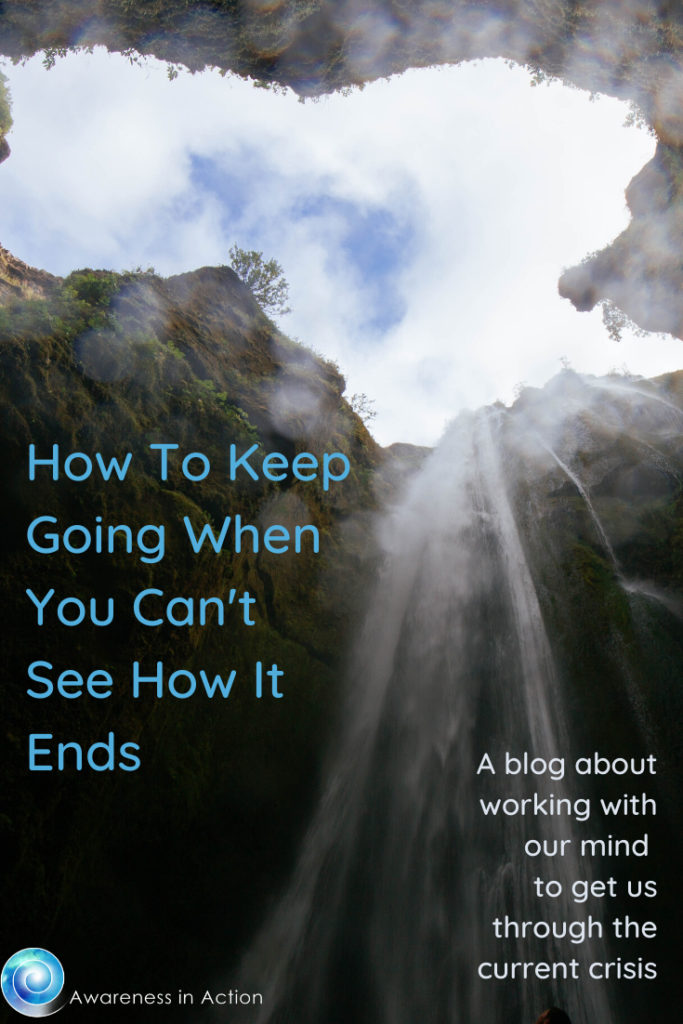Having the ability to keep going when things are challenging is a skill that we’re all going to need to get us through this crisis.
As countries around the world went into lockdown to halt the spread of the corona virus, our lives changed in ways that we could never have imagined. The very shock of it united people in a spirit and the sense that we were all in this together.
Now we’re more than two months further on and although there is still appreciation and support, there’s also a whole buzz of differing opinions and conflicting areas of interest. Where politicians were united in trying to ride out the initial impact, now there’s all kinds of disagreements about how to go forward. When can schools open? How safe is it to go back to work? When can we go on holiday?
As we try to keep going through this and stay well, there are huge economic pressures building up for most of us. We don’t know how this is going to turn out. Will I lose my job?Will there be a second wave? When will there be a vaccine?
So, what can we do?
Embrace your vulnerability
First off, we have to take time to allow ourselves to feel whatever we feel—frightened, anxious, or uncertain. Our default position is to try and protect ourselves from pain, but it never really works. Trying to cover over our vulnerability cuts us off from fully experiencing what life has to offer. It makes us shrink into ourselves—and it prevents us from seeing the vulnerability of all other people.
Something we could try is when we feel bad about something—worried about money, or fearful of getting sick—is to simply allow ourselves to experience the feeling. Most of the time we get drawn into our feelings and swept away by the rush of thoughts and stories that we weave around them. Then we really feel bad.
What we could try here is to lightly touch the feeling and accept that we’re feeling it. We simply hold it in our awareness. Gradually, we can remember that these are exactly the same kind of feelings that everyone has. Just as we are vulnerable, so are other people.
Be prepared to get it wrong
Any time we make a mistake or get something wrong we’re likely to feel particularly vulnerable. In order to avoid the rawness of feeling bad it can be only too easy to get into blame. Our relationship ends and we decide it is the fault of our partner. We’re not happy at work and we decide it is because of our boss.
Sometimes we turn on ourselves and direct all the blame there. We feel embarrassed and decide we are a failure. Just this week, a friend was telling me that she’s finding it hard to just keep going when she has been being isolated for so long. Her take was that she should be able to cope better and appreciate how relatively comfortable her circumstances are. She needed reminding that her feelings were perfectly natural and understandable. There was no need to add to her discomfort by blaming herself as well.
Another way to deal with failure is to apply the exercise we already tried in the last section—to train ourselves to feel what we feel. Here we can also draw on the body to support us. Often when we’re struggling to get away from something difficult, we experience some kind of feeling in our body. Perhaps it’s a stiffness in the shoulders, a tightness in the chest or a sinking feeling in the stomach. We can use that physical feeling to ground us in the present moment.
So, we connect with say the tightness in our chest and just try to stay with it for as long as we can. If we can do this, we are accustoming our nervous system to relaxing with the truth. As we do this, we feel our experience shifting and changing. We can’t pin it down. In this way, we’re encouraging ourselves to expand, rather than contract. We’re learning to let go, instead of clinging.
Keep going but try not to take sides
We’re all going to have our own views about steps that are being to move countries through this crisis. There’ll be some policies that we agree with and others that we find ridiculous. With all the media coverage presenting one school of thought and then another, there are plenty of opinions to get caught up in.
It’s very easy for us to carry around all ideas of ideas of ‘right’ and ‘wrong, or ‘us’ and ‘them’. Although they may appear as external ideas, they have their roots in how our mind works on a daily basis. Have you noticed how often you have the feeling of not being quite satisfied with yourself, other people, or circumstances in your life? This can be about quite small things but also develop into full-blown anger or hatred.
Then there are the things we’re longing for—a new job, a partner, a new place to live. We think that these things will improve our lives, but it all comes down to seeing them as somehow separate from us.
This current situation gives us plenty of opportunity to try work with this inner polarisation. As we go about our day in this period of lockdown, or semi-lockdown we can notice when our thoughts are going into a ‘for’ or ‘against’ habit. Perhaps we remember a time when we had a lovely meal with friends in our favourite restaurant and we have feelings of enjoyment. Then we remember that it is uncertain when we’ll be able to visit that restaurant again and we feel down. We might even think of someone we know who is already able to go to restaurants and we feel resentful towards them.
What can we do?
Starting to notice what we’re doing is a huge first step. The more we can do that, the more opportunity we have to ask ourselves if we really want to use our energy in this way. Perhaps we decide that no, we certainly do not want to behave in this way but five minutes later we’re off on another round of polarisation. Instead of feeling guilty, we can try to use the unpleasantness of our experience to get smarter. It’s another opportunity to recognise the frailty and vulnerability of the human situation—to understand our deep interconnectedness. Rather than contributing to the aggression and greed that is already out there in the world, we can feel inspired to stay present with our thoughts and emotions and prevent them escalating. We make a decision not to add to the confusion already present.
As you try to keep going remember everything you do matters
When it feels hard to keep going it’s all too easy to wonder if it really matters how we behave. Perhaps we’re feeling a bit down and so we snap at our partner. The feeling comes, ‘Well I’m fed up. He/she needs to understand and anyway, what does it matter?’
Let’s think about that for a moment. If we snap at our partner, a friend, a work colleague then we’re spreading our discomfort around. We’re letting our mood affect others. Maybe it does not feel like such a big deal but think how you feel when someone snaps at you—it’s uncomfortable, right? It’s likely to put the other person in a worse mood and then they’ll go on to snap at someone else.
Apart from how we affect others, think about how snapping at another person affects you. We’re upsetting ourselves and damaging our own peace of mind by behaving as if it doesn’t matter or is somehow justified. Instead we could reflect a bit and ask ourselves if how we are behaving is helping us to overcome old habits or make them more solid. Compare it to how we feel when we manage to be kind, or patient—isn’t that the direction that we wish to move in?
Neuroscientists can now demonstrate how our brains change in relation to our experience. The very thoughts we think make neurological patterns in our brains. That’s something to think about.
Let things be as they are
One of the ways in which we can make it hard to keep going is our tendency to go back over stuff that has already happened and think ahead to what might happen. Allowing our minds to roam back and forth like that can be quite exhausting. If while we try to cope with the situation most of us are in right now, we keep thinking of when it might change, and what might happen we’re making things even harder for ourselves.
Instead we could try to pay attention to what is working well for us as we try to weather this crisis. In my own case, I have a lovely apartment full of books and music and all my textile art stuff. I live with my dear partner. We are comfortable and have plenty to eat. Just in that there is so much to be grateful for and to appreciate.
Then we can extend that by paying attention to other people. None of us are seeing many people just now but we do see them online—or even in our mind’s eye. Think of them as a person in their own right rather than just in relation to yourself. See them as a complex, fragile human being—just as you are.
We’ve spent quite a bit of time in the post looking at ways of being with uncomfortable things. When we can do that, we can truly let things be as they are—imperfect, flawed, extraordinary and transient. We can pay attention to all that we are going through, without needing to know how it ends because we recognise that is simply how life is.

You might be interested in this new zoom+online course which starts on 15 June 2021 HOW DO YOU WANT TO FLOURISH IN YOUR RIPE OLD AGE?
Awareness in Action is dedicated to building a community of people interested in living a life of meaning and purpose based on sustainable wellbeing. If you would like to join with us, you could make a start by sharing and commenting on the ideas you find in the blogs on these pages. Your story is part of our journey.



Thank you so much for sharing this.
So glad that you found the post interesting!